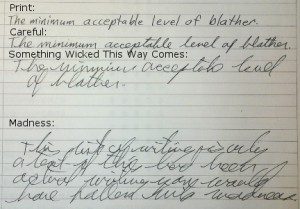Because the girls are finishing up school tomorrow, I’m in the mood to ramble about Japanese schools and a few of the odd differences between Japan and the USA.
First, a few boring details: Japan operates on a year-round school system with the school year starting in early April. The Spring/Summer term runs until the end of July. There is then a six weekish long summer “vacation” (more on that later). Autumn term runs from early September until December 27th or so, then there’s a ten dayish break for the new year. The winter term runs from early January until the end of March. Students and teachers then have about two weeks to prepare for the next school year–which for some teachers involves moving to new schools in new cities.
Elementary school is very laid back–although the students get way ahead in math compared to their Western counterparts by using rote memorization of times tables, speed drills and other techniques Western educators have proven don’t work.
Starting in junior high school, students in public schools put on uniforms and boys and girls begin to be physically separated more and everyone begins to study their “roles” in Japanese society. The boys will be the leaders; the women will serve tea and, hopefully, according to the Japanese government, start producing babies in order to keep Japan stocked with future workers whose future taxes will support the aging population. (Keep that in mind when someone tells you the US needs an educational system more like Japan’s.)
Extra-curricular activities are also taken much more seriously. At the beginning of the year, older students recruit 7th graders to join their clubs. The choice is important because once you’re in a club, that’s your club for the rest of the year. It is, for example, not possible to be in the band during football season and then play basketball and then go back to being in the band during track season. Many clubs also meet during the holidays.
I remember being shocked after we moved back to Kansas that football practice at Southeast of Saline High School had started over a week before school started. However, in Japan it’s normal for some clubs–especially sports clubs–to meet nearly every day of the year, including Sundays. My oldest plays the flute in the brass band club and in one year she’s probably already had more practice time than I had in six years of playing the trumpet. (She’s also much better at flute than I ever was at trumpet.) She did get in trouble, though, for missing practice while she was visiting her grandparents in the USA last summer. (She Who Must Be Obeyed wisely keeps me away from the teacher; although I serve as a kind of “bad cop” last resort.)
It’s also standard operating procedure for teachers to give reams of homework during holidays. The students diligently put all this off and finish it in a mad rush at the end of the holiday.
Complicating matters, especially for Junior high school, is the emphasis on entrance exams. In Japan students don’t simply move from the local public junior high to the local public high school. Instead, they prepare for rigorous entrance exams in order to get into the school they want and, hopefully by default, the university they want. Failing to get into an elite high school pretty much ruins any chance a student has of getting into the best universities. As a result, many parents send their kids to evening “cram schools” that prepare the students for the entrance exams. These classes, of course, can’t take place until after clubs let out which results in a lot of students dragging themselves home at 9:30 or 10:00 at night and then having to eat supper, take a bath and do their school homework.
Especially in public schools, many students consider “cram school” to be their real school and the school they go to during the day is their chance to have fun with their friends. Classrooms are therefore usually much more noisy than most Westerners expect them to be and the students a lot more rude to teachers.
I’ve never wanted to be a helicopter parent, but I am always hovering around the edges, ready to swoop in with my crazy Western ideas that holidays are supposed to be a time for the students to relax and recharge.

